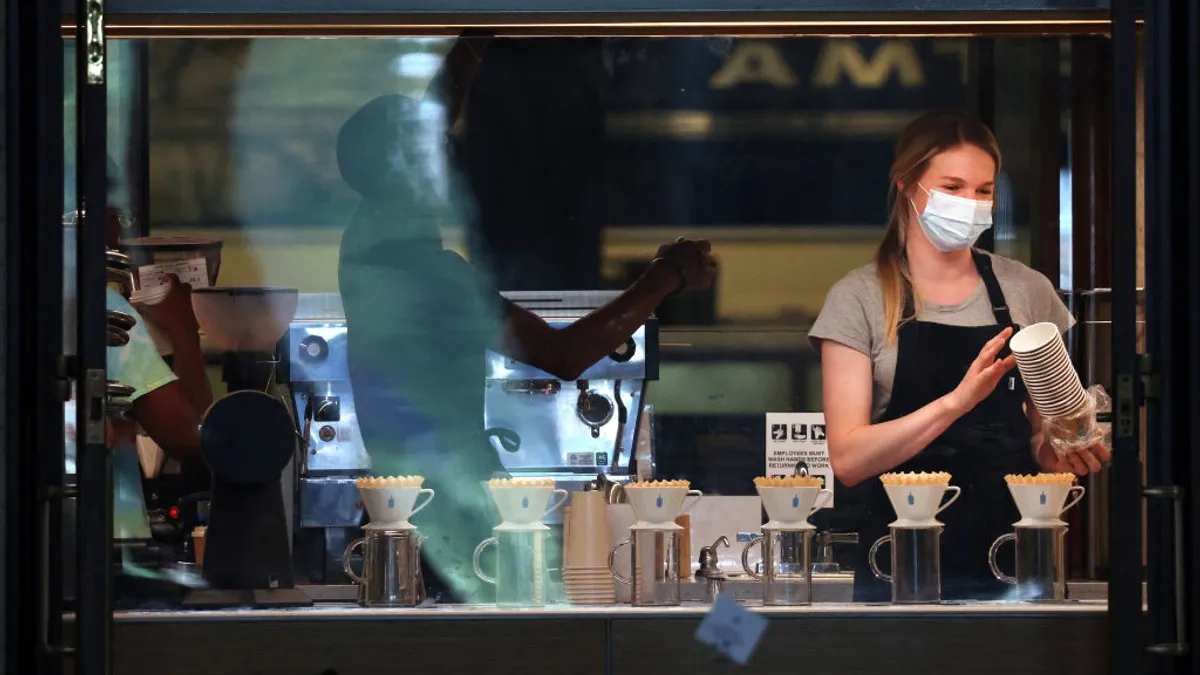What can HR learn from the U.S. Equal Employment Opportunity Commission’s legal moves on COVID-19?
Plenty, according to Joseph Lynett and Sheri Giger, principals of Jackson Lewis P.C. The EEOC “rarely files lawsuits, because of its own administrative budgets,” Lynett noted during a session the two participated in Aug. 31 for the Disability Management Employer Coalition’s annual conference. Therefore, watching the cases the agency did choose to take up over the past year can give employers a sense for how the virus is changing the legal landscape.
Below are three suits the EEOC filed in September 2021 — and the takeaways for employers.
Case No. 1: A worker who allegedly endured harassment for asking to wear a face mask
On Sept. 24, 2021, the EEOC filed suit against U.S. Drug Mart, a Texas-based pharmacy (EEOC v. U.S. Drug Mart Inc., No. 3:21-cv-00232 (Sept. 24, 2021)). According to EEOC’s complaint, the pharmacy violated the Americans with Disabilities Act by subjecting an employee with asthma to a hostile work environment by harassing him and refusing his accommodation request to wear a face mask at work.
According to the EEOC’s complaint, management informed the employee that it “was not allowing any employee to wear a facemask since it might give the appearance to customers that the employee was sick.” (The events occurred in March 2020, prior to the CDC’s recommendation that all people wear masks in public.)
EEOC has noted that an employer can turn down a request for accommodation if the employee would be unable to perform the essential functions of their job or if it would cause “undue hardship,” typically an issue of cost or logistical difficulty. Neither would seem to apply in the case of using a face mask; indeed, in guidance related to the ADA and COVID-19, the EEOC lists face masks as a reasonable accommodation for unvaccinated employees.
Courts have even upheld mandates that require people without disabilities to wear masks to protect others with disabilities. In March, the 8th U.S. Circuit Court of Appeals ruled that mask mandate bans in Iowa public schools violated federal disability law, for example.
In its response to the EEOC’s complaint, U.S. Drug Mart admitted some facts but denied others. It filed a motion for summary judgment, which remains pending. “Let’s see what happens with that,” Lynett said.
Case No. 2: A coffee shop that allegedly denied accommodation of less face-to-face contact
In another suit focused on a Texas-based business filed the same day, EEOC charged 151 Coffee, a coffee shop located in North Richland Hills, with discriminating against two baristas who requested minimal contact with customers upon their return to work in May 2020 (EEOC v. 151 Coffee, LLC, No. 4:21-cv-01081 (N.D. Texas, Sept. 24, 2021)).
According to the EEOC’s complaint, the workers, who had multiple sclerosis and pulmonary valve stenosis, respectively, each requested minimal customer contact as a reasonable accommodation, and were both told they could not return to work until a COVID-19 vaccine had been developed. In both cases, the EEOC said, 151 Coffee “did not propose or discuss alternative accommodations.”
“Now vaccines are widely available, so part of this case is irrelevant,” Lynett said. “But the other part of this case from a legal perspective is a little bit concerning, because the nature of the barista job is almost to have face-to-face contact with the customer. It’s hard to do that job without having face-to-face customer contact.”
In May, Coffee 151 paid $70,000 to settle the EEOC’s charges and entered into a two-year consent decree, which requires the company to disseminate a workplace policy on disability discrimination and provide annual ADA training for HR, management and corporate staff.
While the essential function of face-to-face contact for a barista may be up in the air, as Lynett noted, the EEOC focused on what it perceived as the coffee shop’s poor procedure. “The need for an interactive process when an employee requests reasonable accommodation of a disability applies regardless of the circumstances,” Meaghan Kuelbs, trial attorney in the EEOC’s Dallas District Office, said in the agency’s release.
Case No. 3: A worker denied the accommodation of working from home two days per week
In the final case highlighted by Lynett and Giger, the EEOC filed suit against ISS Facility Services, Inc., a Denmark-based facility management services company, for not allowing a worker with a disability at a Covington, Georgia, facility to work remotely two days per week (EEOC v. ISS Facility Services, Inc., No. 1:21-cv-03708 (N.D. Ga. Sept. 7, 2021)).
According to the EEOC, employees at the facility had worked remotely four days per week from March through June 2020, when the company reopened the facility. At that time, the worker asked for the accommodation of two days of remote work per week, along with frequent breaks when working on-site. “Although the company allowed other employees in Moncrief’s position to work from home, it denied Moncrief’s request and, shortly thereafter, fired her,” EEOC said in its release.
The ISS case, a decision on which is pending, “is one that should garner most concern for employers currently,” Lynett said. “What that case really highlights is that … you're gonna have a tough case denying a request for reasonable accommodation on the basis that all essential job functions can't be done if the employee [has been] working remotely for any period of time.”
For employers considering remote work as a reasonable accommodation — or denying such an accommodation — they must consider, Giger noted, “did the remote work… work? Was it effective? Is regular and predictable [physical] attendance an essential function?”
While vaccine-related suits will likely recede, Lynett and Giger noted, suits involving employees’ right to remote work will likely ramp up and continue in the months or years ahead. “I think that this is going to be an issue of future litigation and claims,” Giger said. “The case law goes every which way on this.”




















